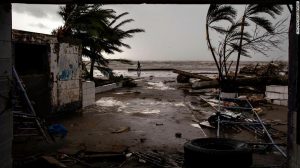Modern Security Issues: The Increased Role of Technology and Cyber Warfare

https://www.rferl.org/a/russia-cozy-bear-hackers-return-western-intelligence/30734514.html
https://www.nytimes.com/2020/12/14/us/politics/russia-hack-nsa-homeland-security-pentagon.html
In the past week, the United States learned that a large-scale Russian intelligence agency hack had breached the State Department and even parts of the Pentagon. This highlights the shift in international security threats being increasingly cyber-related instead of conventional military confrontations. In what is being called an “operation whose sophistication stunned even experts who have been following a quarter century of Russian hacks”, it is evident that today’s international security issues surrounding cybersecurity and cyber warfare are reaching unprecedented levels for which the past has not prepared us. In the pre-Cold War international arena, cyberspace simply did not exist, and technology was not advanced enough to play as large a role as it does now. In order to successfully harm an opponent, direct physical force was required. Before the Cold war, lethality was kinetic, but with today’s technology, that is no longer necessary; a cyber-strike against a country could harm thousands by simply shutting down a power grid. As this Russian hack shows, serious security threats against states can occur from thousands of miles away without being discovered for weeks. Past lessons in national defense do not help solve these issues, as no number of boots on the ground or ICBMs can protect classified national information from cyberwarfare.
Modern Security Issues: The Rise of Non-State Actors

AP Photo/Sunday Alamba
https://www.aljazeera.com/news/2020/12/16/nigeria-student-attack-17-pupils-rescued-from-boko-haram
On Tuesday, December 15, 17 of the more than 300 Nigerian schoolboys abducted by Boko Haram were rescued. The past Friday, gunmen had attacked an all-boys school in Northwestern Nigeria, hundreds of miles from their known base in the Northeast. For years, Boko Haram has been a notorious terrorist group (officially deemed so by the U.S. in 2013) spreading violence throughout the country and that had abducted 200 Nigerian schoolgirls in 2014. Boko Haram is one of many non-state actors, specifically a terrorist group, that have come to dominate the international security arena of the 21st century. Today, issues are not always between two or more states; there are an increasing number of conflicts rising that involve groups, like Boko Haram, with no defined territory, being generally amorphous in organization, and hard to ever pin down to fight conventionally. With this attack, Boko Haram again widens its scope of power, showing that today, non-state actors are a substantial threat to international security. Unfortunately, the past cannot provide many lessons to help solve these issues, as international security issues both during and before the Cold War were strictly between established states. Rules and strategies for confronting state actors are much different than those for non-state actors. For example, conflicts with another state involve attacking clearly defined territory controlled by the enemy, there is more possibility for negotiation, or pressures such as sanctions can be put in place. The past has shown these can be effective measures against states, but do not work when applied to non-state actors because many countries, the U.S. being one, has a policy against negotiating with terrorists. Since non-state actors were not an international security threat pre-Cold War, we cannot look to and learn from the past to address the rising number of international security issues stemming from the proliferation of non-state actors.
Modern Security Issues: Environmental Changes

https://www.cnn.com/2020/11/24/americas/covid-19-climate-hurricanes-central-america-intl/index.html
https://www.cnn.com/2020/11/24/americas/covid-19-climate-hurricanes-central-america-intl/index.html
In the month of November, many Central American countries were rocked by two Category 4 hurricanes. Due to massive losses of farmland, crops, livestock, infrastructure, and homes, fears of mass migrations north are rising. At least 3 million people were affected, and hundreds of thousands were displaced or evacuated. Hurricanes and other natural disasters have always been a catalyst for large-scale migrations, but the international issue of climate change has exacerbated the size and magnitude of these events, as evidenced by the strikes of Hurricanes Eta and Iota occurring only weeks apart from one another and leaving a trail of devastation in their wakes. Unprecedented environmental change is one of the largest international security issues we are facing at the moment, as climate change is indiscriminate of countries’ borders both in regards to environmental changes and in the humanitarian crises that follow these events. With changes in storm patterns, temperature, water, and land, entire communities can be struck by famine or drought with nowhere to go in their own country, forcing them to find homes elsewhere. Bordering countries then have to undertake floods of desperate migrants, with potentially nowhere to be readily placed. As evidenced in many European countries (Pai, “The Refugee ‘Crisis’ Showed Europe’s Worst Side to the World”), sudden influxes of migrants can cause chaos in the host country as thousands of people are in dire need of homes, but nationalist sentiment can unfortunately make their acceptance into the host country extremely difficult. Climate change, on the scale we face today, is predicted to cause complications like increases in migration due to resource scarcity and upticks in conflict over depleting necessary resources. This brings forth a need for increased global cooperation in order to solve problems that, on a scale never before seen, could have consequences worldwide.
Lessons From the Past: Combating Insurgency/Terrorist Tactics in 4GW

Undated handout picture of U.S., Taliban and Qatar officials during a meeting for peace talks in Doha, Qatar. Qatari Foreign Ministry/Handout via REUTERS ATTENTION EDITORS – THIS PICTURE WAS PROVIDED BY A THIRD PARTY.
On October 26, the U.S. carried out an airstrike on Taliban forces in central Afghanistan in defense of Afghan soldiers. This operation comes after countless other acts of aggression from both sides in the 19 years the U.S. has been involved in Afghanistan, and is threatening the peace talks between the Afghan government and Taliban that began and have continued since September. Although not just a fight against the Taliban, the United States’ war in Afghanistan is one that they have tried to “win” in some form for nearly two decades with no success. As we have shifted from conventional 3rd Generation Warfare into the unconventional 4th Generation Warfare (4GW), our tactics have stayed fairly the same, even though our enemy is using tactics that better fit the style of war that comes with 4GW. In this instance, it may be beneficial to look to the past for help, as insurgent groups such as the Taliban employ guerilla warfare tactics that were refined by Mao Zedong in his fight against China and subsequently by groups like the Viet Cong. Just as insurgent groups are using lessons from the past on how smaller, non-state actors can defeat much stronger state actors, the U.S. could benefit from studying Mao and similar leaders’ strategies to better understand tactics employed by the insurgent groups of today. Understanding Mao’s conception of using negotiations as a time to regain strength may very well explain why Taliban peace talks with the Afghan government have produced few concrete results, and that the U.S. must prepare for the possibility of more attacks in the future. Mao preached protraction, and the nearly 20 year long war in Afghanistan tells us that to understand groups like the Taliban, it is imperative to know where their strategy originates, as terrorist and insurgent groups both historically use tried-and-true tactics.
